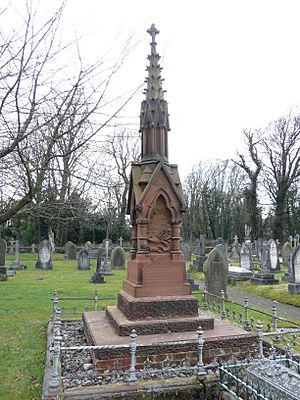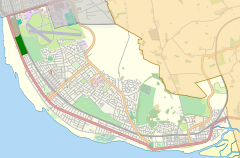Lifeboat Memorial, Lytham facts for kids
 |
|
| Coordinates | 53°44′16″N 2°58′34″W / 53.73774°N 2.97621°W |
|---|---|
| Location | Lytham, Lancashire, England |
| Material | Red sandstone |
| Completion date | Late 19th century |
|
Listed Building – Grade II
|
|
| Official name: Laura Janet monument approximately 30 metres north of Church of St Cuthbert | |
| Designated: | 15 February 1993 |
| Reference #: | 1297684 |
The Lifeboat Memorial in Lytham is a special monument. You can find it in the churchyard of St Cuthbert's Church in Lytham St Annes, Lancashire, England. This memorial remembers 27 brave lifeboatmen. They were from Southport and St Annes. These men sadly died trying to save the crew of a German ship called the Mexico. The ship got stuck on a sandbank during a big storm in 1886.
The memorial looks like a small, fancy building. It is built in a style called Gothic. It has a pointed top decorated with small carvings. This monument is important enough to be protected. It is a Grade II listed building on the National Heritage List for England. This means it's a building of national importance.
Contents
The Tragic Story of the Mexico Ship
On December 9, 1886, a very strong storm hit the coast. A German sailing ship, called a barque, named the Mexico, was caught in the storm. It was pushed onto a sandbank called Horse Bank. This sandbank is near Ainsdale, close to Southport.
Three lifeboats quickly set out to help the ship. They were the Charles Biggs from Lytham, the Eliza Fernley from Southport, and the Laura Janet from St Annes. The Lytham lifeboat successfully rescued the crew from the Mexico. But sadly, the other two lifeboats, the Eliza Fernley and the Laura Janet, overturned in the rough sea.
All thirteen crew members from the St Annes lifeboat were lost. From the Southport lifeboat, only two out of sixteen crew members survived. This terrible event was the worst disaster ever for the Royal National Lifeboat Institution (RNLI). The RNLI is a charity that saves lives at sea.
How the Memorial Was Built
After the disaster, John Unwin, who was the mayor of Southport, started a special fund. It was called the Disaster Fund. People gave a lot of money, raising £31,000. Most of this money went to help the families of the men who were lost.
In January 1887, the fund gave £200 to each of the three local towns. This money was for building monuments to remember the disaster. The Lytham committee decided to build their memorial in the churchyard of St Cuthbert's Church.
What the Memorial Looks Like
The Lytham memorial is made from red sandstone. It is built in a Gothic style, like a small, decorated shrine. It stands about 4 meters (13 feet) tall. The monument rests on a square base with two steps. On top of this base is another stepped platform.
The main part of the memorial has columns at its corners. It also has pointed arches on each side, with steep, triangular decorations above them. On top of this section is a tall, decorated shaft. This shaft is topped with a pointed spire, which has small, hook-like carvings on it.
On the east side of the memorial, there is a carving. It shows a lifeboat crew rowing their boat through a very rough sea. Below this carving, you can read the names of the brave men who died in the disaster. There are also other important messages carved on the other sides of the memorial.
Why This Memorial is Important
The Lifeboat Memorial in Lytham was officially recognized as a Grade II listed building on February 15, 1993. Grade II is the lowest of three levels of protection for buildings. It means the building is important to the country and has special historical or architectural value.
Other Memorials to the Disaster
The Disaster Fund committee also paid for three other memorials. These were built to remember the same tragic event. Two of them are in Southport, and one is in St Annes. All of these memorials are also Grade II listed.
- In Southport, the Lifeboat Memorial is located in the cemetery.
- The Monumental Obelisk stands on the Promenade in Southport.
- The St Annes Memorial is on the Promenade in St Annes. It features a statue of a lifeboatman looking out towards the sea.
 | John T. Biggers |
 | Thomas Blackshear |
 | Mark Bradford |
 | Beverly Buchanan |


